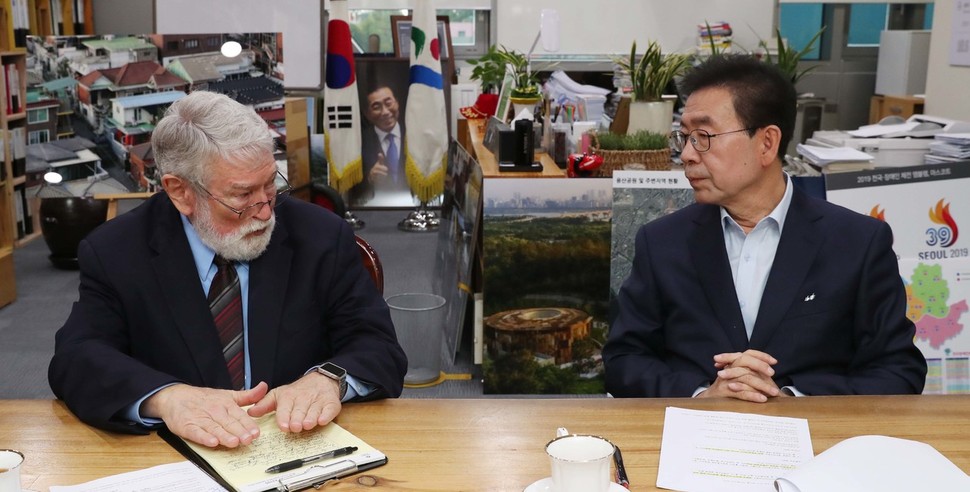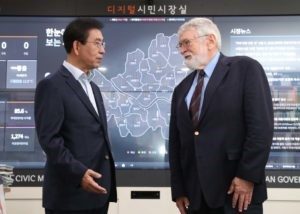A Conversation between David Korten and Park Won Soon (Mayor of Seoul)

The following is an abridged and narrated transcription of the conversation between Dr. David Korten and Mayor Park Won Soon, joined by Professor Cotton. Original translation was provided by Audrey Jang.
** ** **
On the morning of October 10th on the 6th floor of Seoul City Hall, Mayor Park Won-soon and Dr. David Korten, former Harvard Business School professor, discussed the intersection between ecological civilization and urban transformation.
One of the leading scholars elucidating and promoting ecological civilization, Dr. Korten was in Korea for the two-day ‘2018 Seoul International Conference on Transition in Seoul’ hosted by the Seoul Metropolitan Government from November 11 to 12. The event, held under the theme of ‘Civilizational Transformation and the Experiment of Cities,’ was a place for sharing Seoul’s urban innovation experience with the international community and seeking global solidarity for urban transformation. Professor Cotton, a leading scholar who advocates for ecological civilization discourse, also attended the conference, giving a presentation titled “Transition to Ecological Civilization: The Role of the City” on the first day, hosted by the Hankyoreh Economic and Social Research Institute.
Meeting for the first time, Dr, Korten and Mayor Park the two greeted each other with pleasure. Prior to their discussion, they conversed briefly about the various maps and electronic signboards decorating the room. Park expressed sympathy and agreement with Korten’s “ecological discourse,” and Professor Korten, gifting Mayor Park with a signed copy of his book Change the Story, Change the Future: A Living Economy for a Living Earth (2017), endorsed the Seoul’s urban innovation activities. Mayor Park Won-soon, who recently visited four cities in Europe, said, “I personally confirmed the fact that we can revitalize the economy by cooperation rather than competition.”
From Development/Aid to a Critic of Capitalism
Q: Although humanity has continuously developed imaterial civilization, it is difficult to ignore the negative effects on the earth and the natural environment, to the point that the neologism ‘Anthropocene’ has emerged as defining the current geologic age. I would like to hear from both of you about the path that human civilization has walked thus far.
David Korten: “It is time to ask the fundamental questions about what humanity is, and what civilization is. Thus far, civilization has developed by destroying nature and people. A small minority of wealthy people have enjoyed their lifestyles while oppressing the masses, living organisms, and the earth. Above all, the current economic system produces goods by destroying life. This is called ‘suicide economy’. We need to ask the fundamental question of what we really need to live.”
Mayor Park Won-soon: “I fully agree with Professor Korten. A society obsessed with growth not only destroys nature, but also breaks down community and exacerbated social inequality. The majority of people feel in their bones that the present system is no longer sustainable. We need deep reflection and repentance about the crisis we are in, and we need an alternative. The city of Seoul has been working to reduce nuclear power and transition into a walkable city. There are energy-independent villages and eco-mileage system as well. It is time to firmly set the direction of Seoul as a transition city.”
David Korten continued the conversation, drawing on his experience growing up in a conservative middle-class family. He noted that it was while working as advisor to the U.S. Agency for International Development that he became an ardent critic of capitalism as he watched Western European nations’ development policies destroying the lives of indigenous peoples and the poor in developing countries. Listening to Dr. Korten, translator Audrey Jang wondered whether the ecological discourse he emphasized could be applied universally to both the southern and northern hemispheres, where the developmental stage and situation are different.
Professor Cotton: For twenty years I was involved in campaigns to reduce poverty in Africa and Asia. I watched with my own eyes how harmful “development” and “aid” was to local people who had been building a community-centered life. The only helpful impact was maybe in the sanitation department. Residents were driven out of their land and rendered into cheap labor for the factory. The same is true for the more developed countries. Money has already become the mediator between human and human in this society. Before coming here this morning, I looked outside from a restaurant and saw more cars than people. There was only one person in each car. Interpersonal relationships have collapsed. We need to ask ourselves what is truly a good life.”
A Growing Social Economy
Park: “I recently visited four cities (Barcelona, Bilbao, Zurich, Tallinn). In Barcelona, I felt it is possible to make living environment more humane without destroying historical remnants. In Bilbao, I attended the International Social Economy Forum (GSEF), headed by the city of Seoul. There were over 1,700 attendees from 86 countries. I confirmed that it is possible to revitalize the economy not with competition but with cooperation. I gained confidence that movement towards a social economy, which Seoul is also enthusiastically pursuing, is increasingly the global norm.”
Q: The city of Seoul is investing significant effort in the urban regeneration project. Professor Korten, do you have a word of advice for Seoul?
Korten: “I’m encouraged by Mayor Park’s story. (Laughter) The city is in a position to consider the community, even more so than the central government. The central governments mostly create policies for multinational many policies for multinational corporations and large conglomerates. Cities can do more to work out an economic framework that supports communities, instead of an economy for a few rich people. I’ve heard that Seoul is enforcing a labor union (노동이사제). It is a very good policy. In addition, cities should be designed for people rather than cars. There is a need for a paradigm shift towards values, institutions, and infrastructures that enable individuals to engage with one another and participate in society. Urban regeneration, which revitalizes the tradition of the city, is also very important in that context.”
At this point, Professor Cotton pointed to the map of Seoul’s pedestrian streets and praised it as “cool, excellent.” Mayor Park agreed, recounting his experience last summer staying in a rooftop house in Samdeangdong of Gangbuk.
Park: “When I lived in the village (rooftop room), I saw that the village economy had collapsed. Alley restaurants, hardware stores, beauty salons, those are all gone, with only large franchises remaining. Those proceeds all return to the headquarters. I confirmed the 1 vs 99 economy in the village (where 1% of the population owns 99% of the wealth). I realized that even if the city invests in the urban renewal business, the money will only go into the construction company’s pocket. So I made up my mind that the money the city of Seoul collects in taxes should go back to the neighborhood residents. We have to make sure that the products that the locals make are sold.”
Final Thoughts
Q: Do you have any last things you want to say to each other?
Park: “I will listen to your valuable advice. When the Seoul Metropolitan Government first started the community village project, many people questioned, why this talk about villages in a major city, are you saying we should return to the 19th century. No. Even big cities must also start at the village. Even in large cities like Seoul, we must look for the solution in the towns and alleys. The regeneration of the region and of the villages is not in conflict with the development of the large city.”
 Mayor Park chuckled as he offered to Dr. Korten, “Why don’t you remain in Seoul for another month and observe the neighborhood.” In closing the discussion, Korten pronounced three conclusions, one by one.
Mayor Park chuckled as he offered to Dr. Korten, “Why don’t you remain in Seoul for another month and observe the neighborhood.” In closing the discussion, Korten pronounced three conclusions, one by one.
Korten: “First, there is a radical transformation occurring in world leadership: from the prideful individualism of the West to the Eastern thinking that understands the importance of community. Second, even the rich must realize that the status quo has no future. If the people die and the earth dies, it’s all over. We must move towards a society that distributes wealth and revives the community. Third, we do not have much time left. It is too late to make a change. We should do the most we can as fast as we can.
Proceeding and arrangement by Choi Hyeong-sung Hankyoreh Economic and Social Research Institute Citizen Economic Center researcher morgen@hani.co.kr
This article was originally published as “Even major cities like Seoul need to find solutions in towns and alleys.” Access the original through the following link:
http://www.hani.co.kr/arti/economy/economy_general/865286.html
